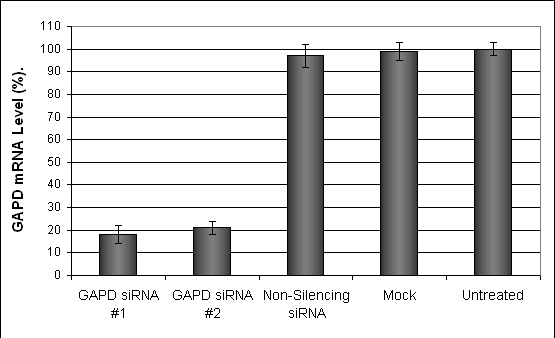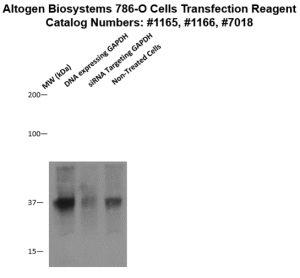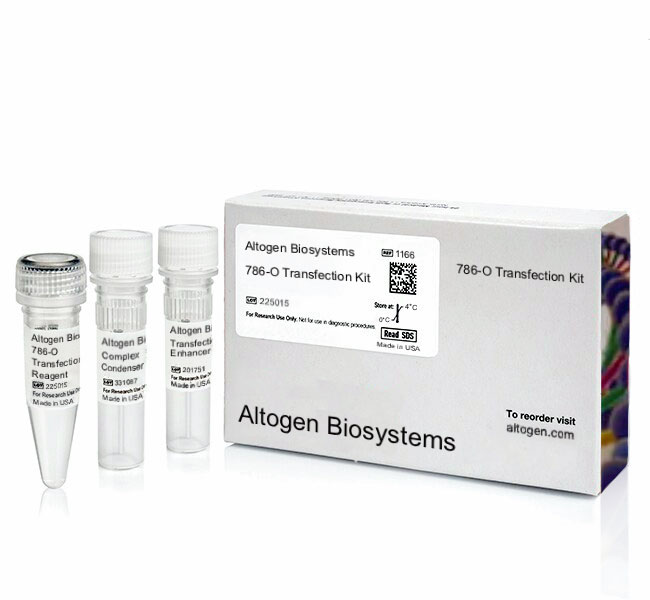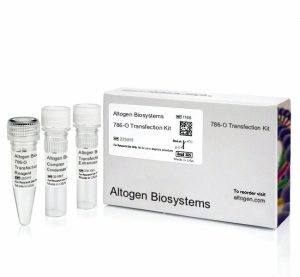Description
Purchase Orders: Click “Add to Cart” button to order, then email PO to orders@altogen.com.
Product Availability: In Stock.
Transfection Reagent for 786-O Cells (Renal Cell Carcinoma, CRL-1932)
- A biodegradable polymer based trasfection agent – once inside the cell, the polymer degrades into smaller less toxic components reducing cell toxicity, facilitating release of the transgene, and improving transfection efficiency
- Optimized for intracellular delivery of plasmid DNA, siRNA, microRNA, and mRNA
- High transfection efficiency of both siRNA and plasmid DNA without compromising cell viability
- Achieve robust siRNA uptake for dependable gene silencing
- Effective transfection under conditions of up to 40% serum
- Transfection kit includes Transfection Enhancer reagent
- Gentle enough to be used for single cell analysis
- Download in vitro 786O transfection protocol: [PDF]
- Download 786O CRISPR/Cas9 transfection protocol: [PDF]
- Download PowerPoint presentation for 786O cells transfection kit: [PPT]
- UPC/GTIN/EAN: 860002089717
-
Brand: ALTOGEN®, developed and manufactured by Altogen Biosystems
Transfection Efficiency:
Reagent exhibits at least 79% transfection efficiency of siRNA delivery. Transfection efficiency was determined by real-time RT-PCR.
Transfection Protocol and MSDS:
Download Altogen Biosystems 786-O Transfection Protocol: [PDF]
Download MSDS: [PDF]
Product Description:
Optimized transfection kit for high transfection efficiency of 786O cell line (human renal cell carcinoma, RCC). Cell line is a human kidney cancer origin used to study the biology of RCC, including cell signaling pathways, drug resistance, and the effects of various chemotherapeutic agents.
786-O Cell Line:
Renal cell carcinoma is the most prevalent type of kidney cancer, and its exact cause is currently unknown. Established human cell lines provide valuable models scientists can use for testing new therapies for renal cancer, enabling for greater understanding of the epidemiology of the disease and treatment options. The 786-O cell line was derived using primary clear cell adenocarcinoma cells taken from the kidney tissue of a 58-year-old Caucasian male patient with renal cell adenocarcinoma. This cell line exhibits epithelial cell morphology and produces parathyroid hormone (PTH). In addition to being an adequate transfection host, the 786-O cell line is essential for studying human infections related to the prostate as well as for prostate cancer research. Altogen Biosystems provides biodegradable polymer-based transfection reagents for the 786-O cell line.
786-O is a human renal cell carcinoma cell line that was originally derived from a primary renal tumor from a patient with renal cell carcinoma. This cell line is commonly used as a model system for studying renal cell carcinoma and for evaluating potential therapies. 786-O cells are known for their ability to form tumors in vivo when injected into immunodeficient mice, and they are commonly used in preclinical studies to evaluate the efficacy of potential renal cell carcinoma therapies. These cells have also been used to study the molecular mechanisms underlying renal cell carcinoma development and progression. 786-O cells are commonly cultured as adherent monolayers and have been shown to express markers of renal epithelial differentiation, such as E-cadherin and vimentin. They are also known to have a high level of genetic instability, which makes them useful for studying the genetic alterations that occur during renal cell carcinoma development. In addition to their use as a model system for studying renal cell carcinoma, 786-O cells have been used to study a wide range of biological processes, including the regulation of apoptosis and autophagy, the role of the tumor microenvironment in cancer progression, and the interactions between cancer cells and the immune system. Overall, the 786-O cell line is a valuable tool for studying renal cell carcinoma and has contributed significantly to our understanding of the molecular mechanisms underlying this disease.
786-O cell line mutations:
| TP53 | 7157 | 37 | 17 | 7578291 | 7578291 | Splice_Site | SNP | T | C |
| PTEN | 5728 | 37 | 10 | 89692961 | 89692961 | Nonsense_Mutation | SNP | C | T |
| OR4K2 | 390431 | 37 | 14 | 20345076 | 20345076 | Nonsense_Mutation | SNP | C | A |
| CRX | 1406 | 37 | 19 | 48342592 | 48342592 | Missense_Mutation | SNP | C | T |
| HCN2 | 610 | 37 | 19 | 605189 | 605189 | Silent | SNP | G | A |
| TNFRSF4 | 7293 | 37 | 1 | 1148443 | 1148443 | Missense_Mutation | SNP | G | A |
| ATAD3A | 55210 | 37 | 1 | 1455523 | 1455523 | Missense_Mutation | SNP | A | G |
| RERE | 473 | 37 | 1 | 8415550 | 8415550 | Missense_Mutation | SNP | C | G |
| EPHA2 | 1969 | 37 | 1 | 16456849 | 16456849 | Silent | SNP | G | A |
| CROCC | 9696 | 37 | 1 | 17249199 | 17249199 | Silent | SNP | C | T |
| PLA2G5 | 5322 | 37 | 1 | 20416287 | 20416287 | Missense_Mutation | SNP | G | A |
| PINK1 | 65018 | 37 | 1 | 20972061 | 20972061 | Missense_Mutation | SNP | G | T |
| EPHB2 | 2048 | 37 | 1 | 23191674 | 23191674 | Missense_Mutation | SNP | C | G |
Data:

Figure 1. GAPD mRNA levels were quantified using real-time RT-PCR in the 786O cells transfected with siRNAs targeting GAPD or non-silencing siRNA. Forty-eight hours post-transfection, the cells were harvested and analyzed by real-time RT-PCR for GAPD mRNA expression levels. Data were normalized against the 18S rRNA signal. Control samples were either mock-transfected or untreated. Values are normalized to untreated sample. Data are means ± SD (n=5).

Figure 2. Protein expression of GAPDH in 786-O cells. DNA plasmid expressing GAPDH or siRNA targeting GAPDH were transfected into 786-O cells following Altogen Biosystems transfection protocol. At 72 hours post-transfection the cells were analyzed by Western Blot for protein expression levels (normalized by total protein, 10 µg of total protein loaded per each well). Untreated cells used as a negative control.
Selected in vivo transfection product citations (ALTOGEN® IN VIVO Transfection Kits used in the following publications):
- Cancer Research. 2011 71(15):5144-53. Inhibition of miR-193a expression by… Iliopoulos et al [PDF]
- RNA. 2010 16(11):2108-19. RNase L releases a small RNA from HCV RNA that refolds … Malathi et al [PDF]
- Diabetologia. 2012 55(7):2069-79. The p47phox- and NADPH oxidase organiser 1 … Youn et al [PDF]
- British Journal of Cancer. 2012 107(3):516-26. TIGAR induces p53-mediated cell-cycle … Madan et al [PDF]
- Hypertension. 2014 63(2):353-61. Tissue transglutaminase contributes to … Liu et al [PDF]
- Circulation Research. 2010 15;107(8). Kruppel-like factor-4 transcriptionally regulates … Cowan et al [PDF]
- Hypertension. 2012 59(1):158-66. Role of uncoupled endothelial nitric oxide synthase … Gao et al [PDF]
- Jounal of Biological Chemistry. 2012 287(4):2907. Chaperoning of mutant p53 protein … Gogna et al [PDF]
- PLoS Pathogens. 2012 8(8) Uridine composition of the poly-U/UC tract of HCV RNA … Schnell et al [PDF]
Altogen Biosystems provides pre-optimized transfection kits and electroporation products for life science research. Transfection products are developed for individual cancer cell line and transfection protocols are optimized to enable high transfection efficiency of biomolecules. Altogen Biosystems developed in vivo delivery products for small animal research, mouse and rat targeted tissue delivery: liver targeted, pancreas targeted, kidney targeted, PEG-Liposome-, Nanoparticle-, Lipid-, and Polymer-based in vivo transfection kits. Advanced formulation of reagents and optimized transfection protocols provide efficient intracellular delivery of biomolecules. Read more about transfection technology at Altogen’s Transfection Resource. Altogen Labs provides GLP-compliant contract research studies for pre-clinical research, IND applications, and drug development. Biology CRO services include: Xenograft models development of stable cell lines, ELISA assay development, cell-based and tissue targeted RNAi studies, safety pharm/tox assays, and other studies (visit AltogenLabs.com).
Volume Options:
- 0.5 ml (Catalog #1165)
- 1.5 ml (Catalog #1166)
- 1.5 ml CRISPR (Catalog #2209)
- 8.0 ml (Catalog #7018)
Purchase Orders: Click “Add to Cart” button to order, then email PO to orders@altogen.com.
Product Availability: In Stock.






